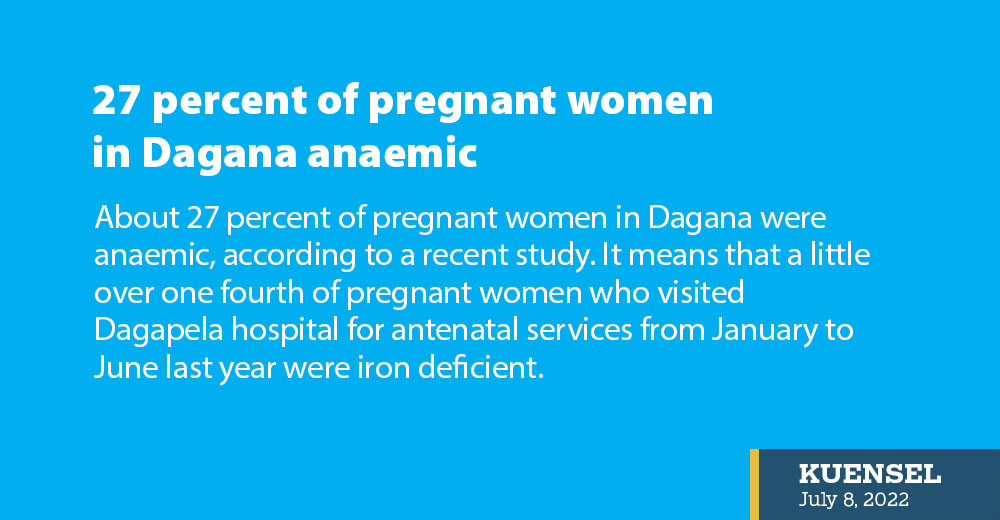Choki Wangmo | Dagana
About 27 percent of pregnant women in Dagana were anaemic, according to a recent study. It means that a little over one fourth of pregnant women who visited Dagapela hospital for antenatal services from January to June last year were iron deficient.
A nutritionist at Dagapela hospital Prem Kumar Neopanay, who co-authored the study said that the trend was worrying as for every 100 women getting pregnant, 27 of them would be anaemic.
“A pregnant woman shouldn’t be anemic as the blood requirement during pregnancy increases by many folds as mother undergoes bodily changes to supply to the growing fetus,” he said.
Studies have shown that anaemia is the most common micronutrient deficiency condition and have proved that it has major consequences on human health resulting in reduced social and economic development. “Iron deficiency anaemia can occur at any stage of life in all genders, but is usually more prevalent in women owing to their higher iron needs during menstruation and pregnancy.”
Anaemia among pregnant women results in increased risk of maternal mortality and increases the risk to the child including higher perinatal mortality, low birth weight, impaired cognitive and physical development and reduced productivity throughout adult life.
Some of the major symptoms of anaemia, according to the nutritionist, include tiredness and lack of energy, shortness of breath, heart palpitations, and pale skin.
The study recommended dietary interventions as in their diets. Interventions include increased iron intake through food-based approaches; dietary diversification and food fortification with iron, iron supplementation, improved sanitation and health services.
Some of the iron-rich foods include dark green leafy vegetables, organ meats like liver, sea foods, pulses, nuts, beet root, and egg yolks, among others.
However, the survey showed there was no relation between the level of education and the probability of suffering from anemia. “Majority (66.7 percent) of them were found to be either literate or educated with their qualifications ranging from non-formal education to university graduates,” it stated.
A total of 123 pregnant women participated in the survey.
Iron-deficiency anaemia is recognised as the world’s most prevalent nutritional disorder, affecting more than two billion people in both developed and developing countries.
Bhutan’s National Nutrition Survey 2015 revealed that 27.3 percent of pregnant women in the country suffered from anaemia. The eastern region had the highest percentage of anaemic women and anaemia prevalence was slightly greater in urban areas compared with rural areas.


